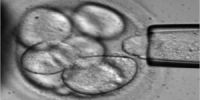Human Stem Cells Effectively Treat Multiple Sclerosis in Mice Models
Human embryonic stem cells are a potentially viable treatment option for multiple sclerosis.

Embryonic stem cells are a potentially viable treatment option for multiple sclerosis (MS), according to research published online in Stem Cell Reports.
Researchers from the University of Connecticut (UConn) Technology Incubation Program studied mesenchymal stem cells (MSCs) from human embryonic stem cells (hESCs) in animal models of MS, comparing the reproductive capabilities of 4 independent MSC lines to 4 different hESC lines.
Each of the bone marrow MSC (BM-MSC) lines expressed high levels of cytokine, a protein that stimulates autoimmunity and can increase the progression of MS. The hESC-related lines expressed little or no stimulation of the inflammatory protein molecule.
In the study, the mice were immunized before the researchers tested the therapeutic abilities of the lines. Then, prior to the onset of MS, the mice were injected with MSCs derived from hESCs (hES-MSCs) or PBS intraperitoneally.
When given one particular line, some mice developed MS with normal progression. Other mice that received different hES-MSCs were found to have delayed disease onset, while a third group of mice seemed to have lower disease incidence. The results were confirmed by analyzing the microglial inflammatory activity within the spinal cord of the mice in each group.
According to the researchers, the benefit to studying hESCs for MS treatment is they can be created in infinite amounts in lab cultures, which further provide unlimited resources for high quality MSCs. The investigators said MSCs are more beneficial than adult bone marrow stem cells because the bone marrow stem cells must be obtained through a donor and vary from sample to sample more widely.
“Groundbreaking research like this furthering opportunities for technology ventures demonstrates how the University acts as an economic engine for the state and regional economy,” Jeff Seemann, PhD, Vice President for Research at UConn, said in a press release.
Corresponding author Ren-He Xu, MD, PhD, noted that researching hESCs is beneficial for more than just finding a treatment for MS. Xu, a founder of ImStem Biotechnology, Inc., said he believes similar therapies may be uncovered for inflammatory bowel syndrome (IBS), rheumatoid arthritis (RA), and type 1 diabetes mellitus (T1DM), as well as a myriad of other conditions.
“In this study, we have shown that multiple hES-MSC lines significantly attenuated disease scores in an experimental autoimmune encephalitis (EAE) mouse model of MS,” the authors concluded. “In stark contrast, only one out of 8 independently derived human BM-MSC lines displayed a marginal effect in the prophylactic-treatment EAE model. Our analysis of interleukin-6 (IL-6) expression and migration of the MSCs suggests that the superior disease-altering effects of hES-MSCs may be related in part to the lower expression of IL-6 and the greater ability of hES-MSCs to extravasate the blood-brain barrier (BBB) and blood-spinal cord barrier (BSCB) and migrate into inflamed central nervous system (CNS) tissue relative to BM-MSCs.”
Currently, ImStem is seeking approval for the treatment from the US Food and Drug Administration (FDA) to make it available for human MS patients.